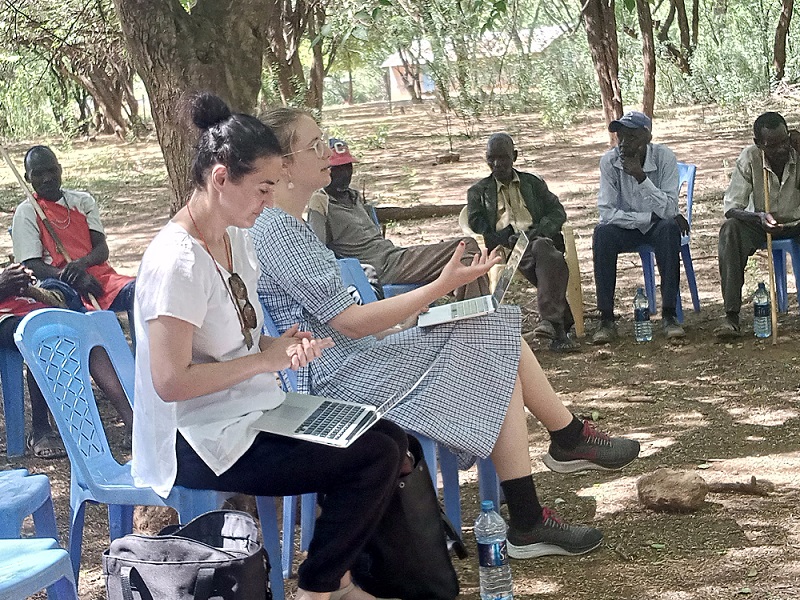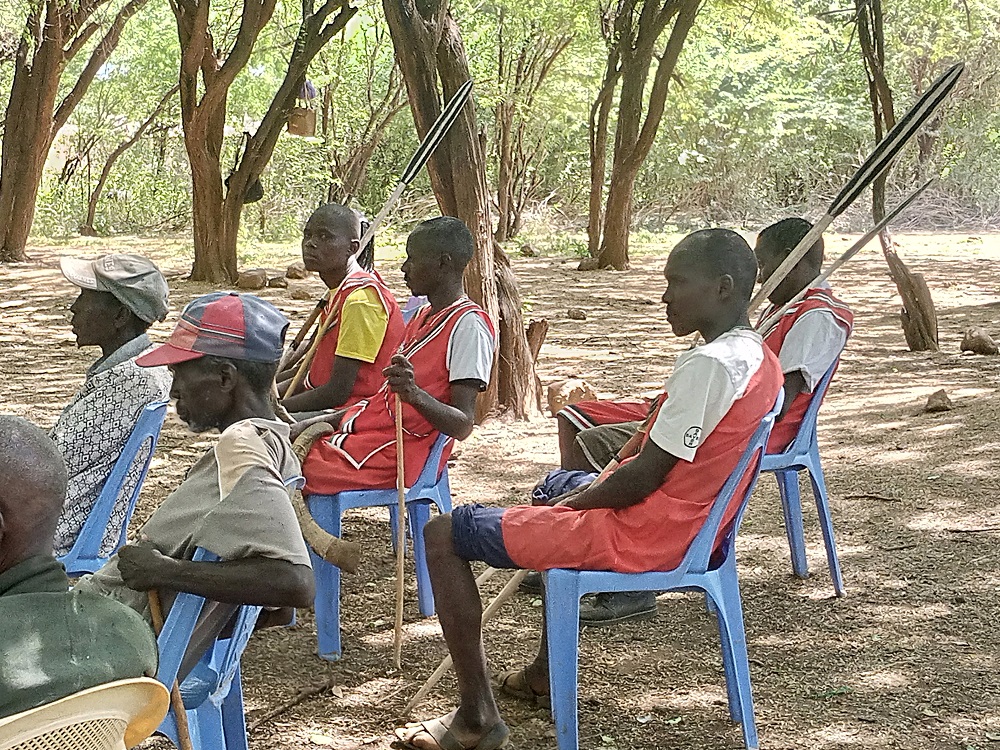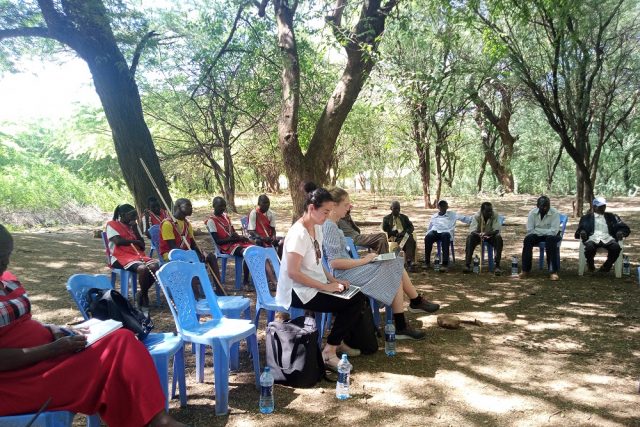On Monday June 6, we had a meeting at Loboi cultural centre on the shores of Lake Bogoria. The meeting was organized by the External Office of the United Nations Special Rapporteur of Freedom of Religion or Belief.
The meeting was called to discuss the issue of African spirituality and African religious practices, challenges faced and whether there are any challenges they face as they practice their African religion.
The meeting brought together Endorois elders, officials of local organizations such as Endorois Welfare Council, Endorois Indigenous Women Empowerment Network, cultural dancers, human rights activists and local administration.
Endorois Spiritualism differs from Christianity and Muslim faith in a way that the latter is practiced when there is a disaster and there are specific families chosen to lead in prayers at the sacred shrines.
Endorois spirituality involves offering animal sacrifices to the gods. Only white or red colored animals were sacrificed, no black animals were offered for sacrifice.
As we speak, there are some households among the indigenous communities who practice African spirituality. These people do not belong to Christianity, Muslim or Hindu faith.
These African religion believers worship their gods and perform rituals the most recent major rituals were performed in 2018 after returning to their land from which they were displaced previously.
People with Disability and African Spirituality
People with Disability (PwD) were/are not allowed to participate in the the rituals or offering sacrifices to the gods. They were/are considered not to be holly. This might be a source of discrimination in some African Spirituality practices. PwD can only be part of the general celebrations but not the rituals.
There are many sacred sites around lake Bogoria. Each is used for a specific occasion such as circumcision or offering prayers when there is a disaster. Every family has their own sacred site.
What do people of other faith think about African Spirituality?
Many Christians and Muslims belief that those who practice African spirituality are backwards and they are discriminated because no development is provided in the areas where they reside.
The indigenous people used to practice paddocking; they used to set aside let’s say 100 acres which they use during a certain season and then move on to other lands later on to leave the previous land to rejuvenate and return later on.

As a result of forced evictions conducted in 1977 by the Kenyan government to pave way for the establishment of Lake Bogoria national reserve, the Endorois ethnic minority lost access to their sacred sites, grazing fields, salt licks, trees on which they used to hang bee hives, medicinal herbs and other resources.
According to Samuel Kiptek, an Endorois elder, cultural prayers at Lake Bogoria were performed at various times such as during droughts and disease outbreaks. They prayed to the gods to help them cure from diseases.
They used to give thanks to the gods. Now you cannot have access to the shrines without permission from the Kenya Wildlife Service (KWS).
According to the elders we spoke with, there were prayers offered by the make elders and other by women. Those prayers offered by Endorois male elders are known as Ndasome. These prayers would not be said by the youth or women. They were special prayers.
Endorois used to keep cows, goats whose numbers have reduced significantly due to the the establishment of the Lake Bogoria national reserve.
Now the community cannot have access to the drinking water from the water springs which are in the national reserve.
When they were evicted from Lake Bogoria, the community members lost a lot of economic activities they were undertaking around Lake Bogoria.

In the past, water at around Lake Bogoria was never polluted. They associate this to the prayers the community used to offer. Now water is polluted and salty. The wildlife authority was advised to seek help from the local community and offer prayers to cleanse the water. This is done from time to time but still the community believes that the prayers offered are not complete because the rest of the community is not involved. Therefore, the water has remained salty and smelly.
“When the KWS discovered the change in quality of water, they invited the families who were leading in prayers to offer the prayers,” said one of the elders during the consultations.
Among the Endorois, four families were given the mandate to offer prayers among the Endorois . These are: the Mpsmacha, Kapcherono, Kakrerowoi and Talai.
During the construction of sacred shrines, Endorois community members offered prayers during various occasions. One, was before they built and prayed as they built the shrine.
Fertility and African Spirituality
Traditionally, when one is barren, women make a ceremony and the child is born it the child is called Kipkoros and a lady Chepkororos. God would listen to them and they would receive answers for their prayers.
Women offer advise to young ladies who made mistakes in their homes. They elderly women counsel young women who violate cultural practices.
Supreme Council of ladies would advice and disciple them; one of them is if the lady is not respecting the husband, if they separate without living the children with the man; Age set, if a married woman is not faithful to her husband, the woman is rebuked and counselled. When Endorois women carry children on their back if they are not tied properly;
The distinction between Endorois Religion and Christian culture, offering sacrifices, etc is common in Christianity and African religion;
In African religion, there is no reading Bibles, the location for Christianity is churches. African religion, there are seasonal prayers in response to disasters such as drought, famine, war etc
Christianity came in recently compared to African religion which has been in practice for centuries. Christian practice both culture and Christianity.
Challenges in Practicing Endorois Traditional believes
In order to access sacred sites, the community needs permission from the Kenya Wildlife Service. They only allow few people which is not as effective as community prayers.
There are special prayers which are specific to Lake Bogoria and no where else.
Are they given reasons why they are not allowed to lake Bogoria
No. They provide excuses such as you are scaring away the wild animals which tourists come to see. When they go for prayers, they are companied by dogs which scare the wild animals.
Government has always despised traditional religion. They sometimes depict it as demonic,
Elders who practice as overseers are labelled as wizards and they face danger as a result. There is a challenge where Christians want to convert everyone into their religion.
There is need to equip and refurbish the Endorois Cultural Centre to be a learning center for the community. The center should be easily accessible to Endorois people for them to learn their culture and language.
Africans should train their children to speak their indigenous languages wherever they might be located around the world.
The community has biocultural protocol which need to be publicized and content known by everyone in order to advance the culture of the community.
Non-implementation of the ruling of the Endorois case is the barrier to development and this is impoverishing the community because of the long wait.
Endorois community needs legal support against bio-cultural piracy from big companies.
Endorois have been facing ‘terrorism’ from criminals because of the natural resources that they have on their land. They have lost lands, livestock and public facilities due to what started as cattle rustling. Now it has escalated to killings and robbery of community resources.
The rising of Lake Bogoria has displaced large number of families from their ancestral lands. The United Nations should address this issue as a point of concern.
GOT a story? Contact Kerosi Dotcom on EMAIL info@kerosi.com


